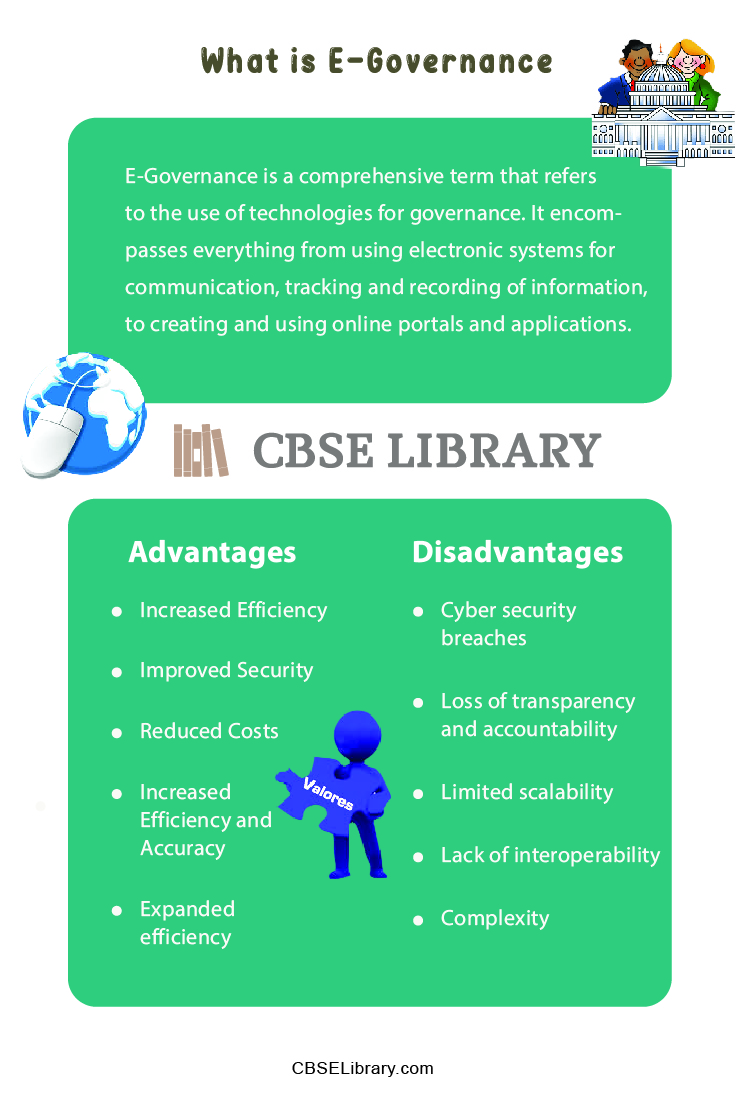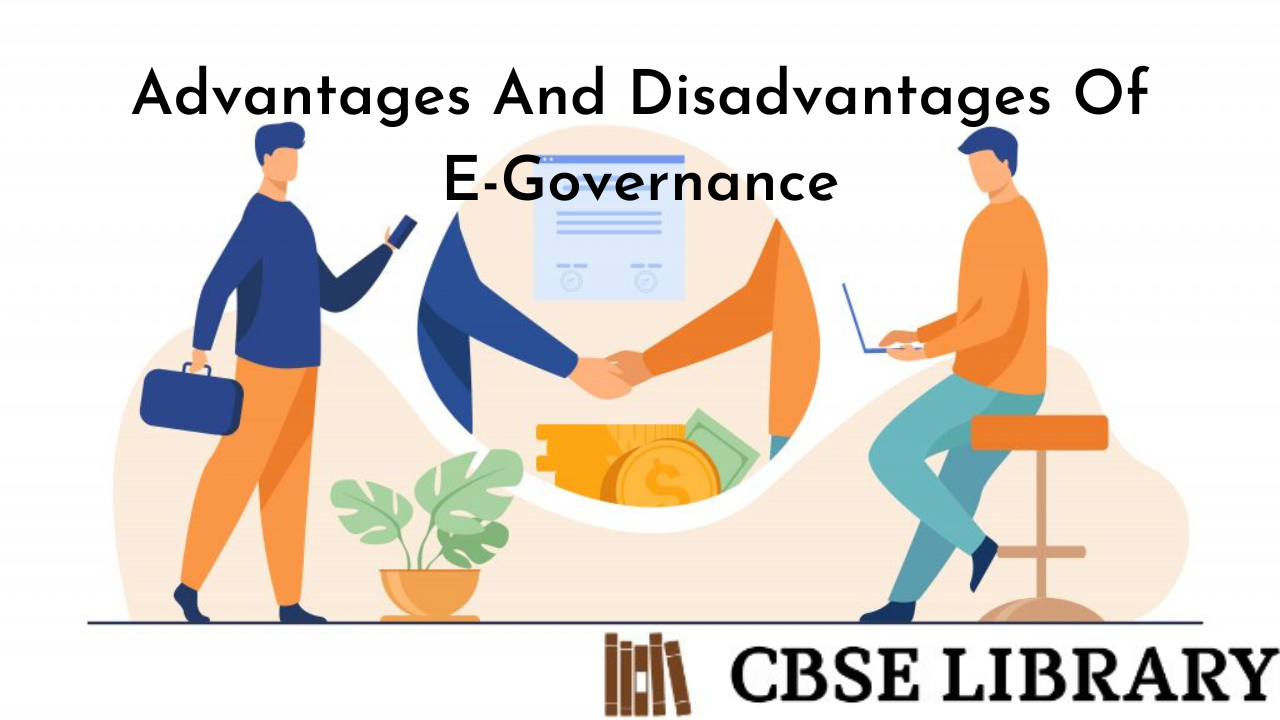E-Governance Advantages And Disadvantages: E-governance is the use of technology to enable better governance and management of public services. It has been described as “the process of transforming government through the application of information and communication technologies in order to make it more effective, efficient, accessible and accountable.” In this article, we will look at the definition of e-governance, its advantages as well as disadvantages.
Students can also find more Advantages and Disadvantages articles on events, persons, sports, technology, and many more.
What is E-Governance? What are the Advantages And Disadvantages Of E-Governance?
E-Governance is a comprehensive term that refers to the use of technologies for governance. It encompasses everything from using electronic systems for communication, tracking and recording of information, to creating and using online portals and applications. E-governance enables improved communication and collaboration between different departments or agencies. It also reduces costs associated with traditional methods of governance, such as printing and mailing documents, running meetings and dealing with paperwork. Other benefits include enhanced security and protection of sensitive data. It also promotes more efficient management of resources due to the use of automated decision support systems (ADSs). E-governance can also improve public accountability and transparency and it can be easier access to government information for the general public.
- Advantages of E-Governance
- Disadvantages of E-Governance
- Comparison Table for Advantages and Disadvantages of E-Governance
- Conclusion on E-Governance – Advantages And Disadvantages
- FAQs on Advantages And Disadvantages of E-Governance
Advantages of E-Governance
There are many advantages to using electronic government tools, including increased efficiency and security. Here are five key advantages:
- Increased Efficiency: Electronic systems are often more efficient than traditional methods, both in terms of the time it takes to complete a task and the amount of information that can be processed. This is due to the fact that e-government tools allow for better communication and collaboration between people involved in a process, as well as the use of automated systems that can take care of many routine tasks.
- Improved Security: Electronic systems are usually more secure than traditional methods because they allow for greater control over data and access to it by authorised individuals. In addition, e-governance systems often use secure networks and passwords to protect information from unauthorised access. This makes them a preferred choice for businesses that need to protect sensitive information from theft or unauthorised access.
- Reduced Costs: One of the main benefits of e-government is that it can save money on costs associated with traditional methods, such as hiring additional staff or purchasing hardware. This is due to the fact that e-government tools allow for the automation of tasks and tracking of performance data, which can save time and money.
- Increased Efficiency and Accuracy: E-government systems are often more accurate than traditional methods because they are designed to capture all the necessary data. This means that decisions made using e-government tools are usually more accurate than those made using traditional methods.
- Greater Accountability and Transparency: E-government systems allow for greater accountability and transparency between government officials and the public, as well as between different government agencies. This is due to the fact that e-government tools allow for the sharing of information in a secure manner, as well as the tracking of progress and performance data.
Disadvantages of E-Governance
E-Governance, or electronic government, has a number of advantages and disadvantages. Disadvantages include the potential for cyber security breaches, susceptibility to manipulation by unauthorised individuals, and loss of transparency and accountability. In a nutshell, its disadvantages include:
- Cyber security breaches: One of the main disadvantages of e-governance is the potential for cyber security breaches. Any electronic data or information that is stored in an e-government system can be vulnerable to attack. This can include personal information, financial records, and official documents. Cyber security breaches can have serious consequences, including damage to public trust in e-government systems, loss of tax revenue, and embarrassment for government officials.
- Susceptibility to manipulation by unauthorised individuals: Another disadvantage of e-governance is the sensitivity of electronic data to manipulation by unauthorised individuals. Any individual with access to an e-government system can tamper with or delete data. This could allow them to commit fraud or other crimes undetected. It also makes it difficult for authorities to investigate any wrongdoing.
- Loss of transparency and accountability: One disadvantage of e-governance is the loss of transparency and accountability. Because electronic data is often confidential, it is difficult for citizens to access information about government activities. And because electronic documents are often not archived or preserved, it is difficult for future generations to understand government decisions made in the past.
- The need for advanced technical skills in order to use e-government tools effectively: Operating E-governance tools requires a certain level of technical know-how, hence, finding the right candidate can be quite difficult.
- Limited scalability: E-governance relies on a centralised system, which can be difficult to scale up or down
- Lack of interoperability: Different systems used in e-gov can be difficult to integrate with each other. This can result in inconsistency and error across government agencies.
- Complexity: E-governance systems can be very complex, making them difficult for governments to use and operate.
- Cost: E-gov systems can be expensive to set up and maintain, which could impact the ability of governments to implement them sustainably.
Comparison Table for Advantages and Disadvantages of E-Governance
Following are the advantages and disadvantages of E-Governance :
| E-Governance Advantages | E-Governance Disadvantages |
| Higher efficiency | Risk of cyber security breaches |
| Better security | More susceptibility to manipulation |
| Lower costs | Lack of accountability and transparency |
| Increased accuracy and efficiency | Advanced technical skills are a requirement |
| Higher transparency and accountability | Complexity, cost and limited scalability |

Conclusion on E-Governance – Advantages And Disadvantages
There are a lot of advantages and disadvantages to using E governance, so it’s important to weigh up the pros and cons before making a decision. Ultimately, the decision about whether or not to adopt E-governance will come down to various factors which have been discussed above.
FAQs on Advantages And Disadvantages of E-Governance
Question 1.
What is E-Governance?
Answer:
E-Governance is a system that uses electronic systems to manage local, regional, and national government functions. It includes a variety of technologies, such as information technology, telecommunications, and e-commerce. E-Governance can help reduce costs and improve efficiency by providing government officials with the same tools that citizens use to access information. For example, e-government systems can allow citizens to file taxes online or request permits online.
Question 2.
What are the advantages of E-Governance?
Answer:
E-Governance is a technology that enables the government to electronically interact with citizens and businesses. It has many advantages, including saving money on administration costs, improving transparency and accountability, and reducing corruption. It also makes it easier for the government to reach out to its citizens and keep them informed about important developments.
Question 3.
What are the disadvantages of E-Governance?
Answer:
E-Governance is a term used to describe the use of technology to improve how governments operate. There are many benefits to using E-Governance, but there are also some disadvantages. One disadvantage is that it can be difficult for people to understand and use the technology. Another disadvantage is that it can be expensive to set up and maintain.
Question 4.
Why is E-Governance important?
Answer:
E-Governance is the use of electronic systems to improve the efficiency and effectiveness of government operations. It can be used to reduce corruption, speed up decision-making, and improve transparency. By using technology, governments can provide better services to their citizens. E-Governance also allows governments to interact with their citizens more easily and share information more effectively.
